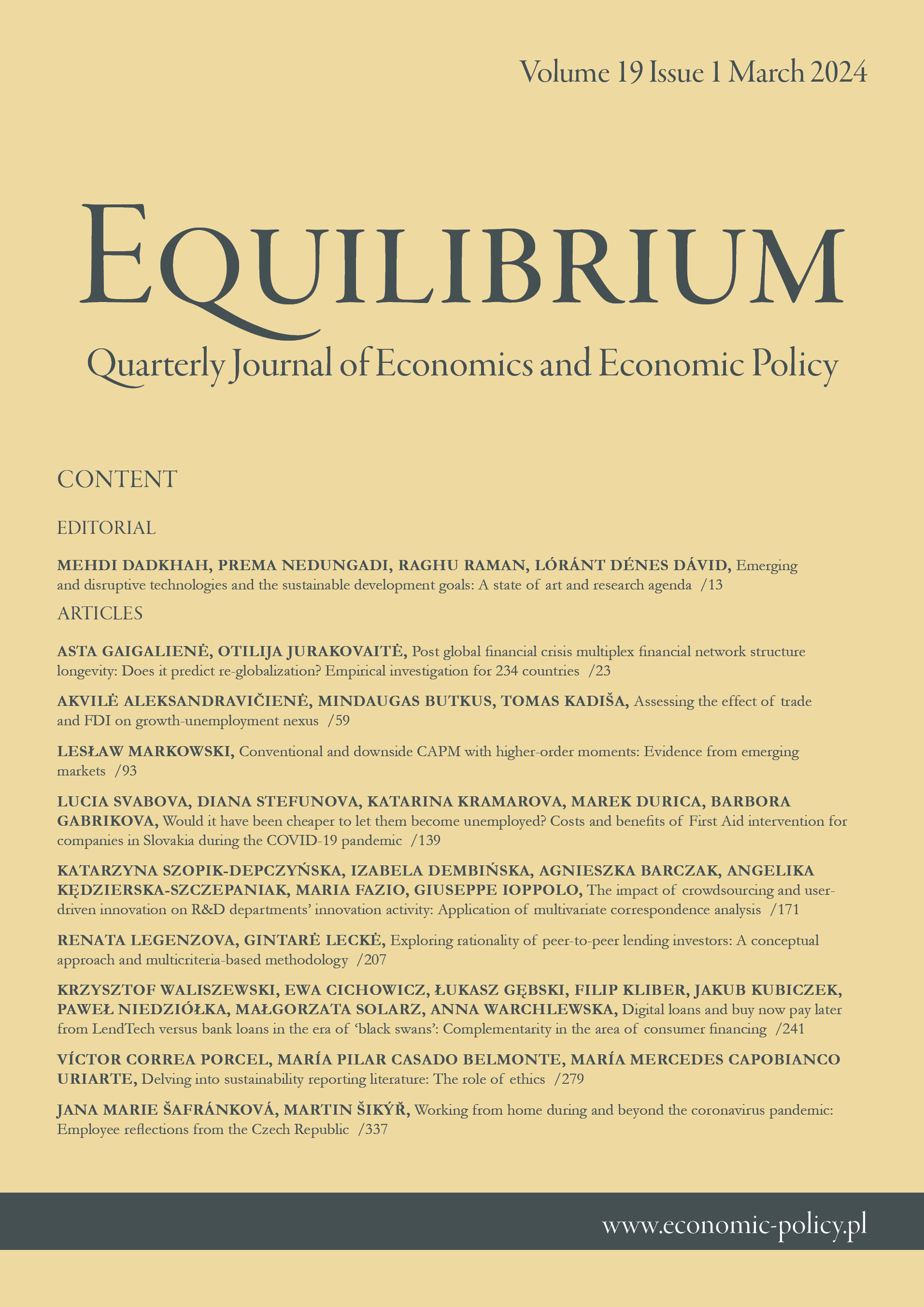电子商务市场中电子客户对可持续最后一英里交付的偏好:跨代视角
IF 6.2
Q1 ECONOMICS
Equilibrium-Quarterly Journal of Economics and Economic Policy
Pub Date : 2023-09-30
DOI:10.24136/eq.2023.027
引用次数: 0
摘要
研究背景:过去几年,电子商务市场的人口份额有所增加,但自新冠疫情以来,情况发生了巨大变化。由于快速数字化和购物,电子市场已经发生了变化。在线服务提供了选择不同送货方式的可能性,如送货上门或送货上门。电子商务市场的这一方面面临着从业人员和学术界对可持续最后一英里交付领域越来越大的兴趣。有趣的是,主题文献包括分析电子商务对最后一英里配送影响的论文。然而,确定选择交付方式的因素和激励电子客户选择环保交付方式的因素仍然是一个未被认可的研究领域。本文的目的:本文的作者专注于城市可持续配送的电子客户视角。因此,本文的主要目的是比较激励电子客户选择交付方式的几代人之间的因素。方法:对波兰2021年的1.110名电子客户进行调查。本文旨在回答以下研究问题:是什么因素促使每一代人选择一种交付方式?为了回答上述问题,准备了对应分析(MCA),以帮助识别和比较每一代的因素。的发现,附加值:最初的研究过程侧重于使用多元统计方法来研究电子客户的偏好。分析显示,在支持可持续因素方面,有三种类型的电子客户:(a)年龄在65岁以上,没有支持可持续的倾向;(b)年龄在18-64岁,有支持可持续的态度;(c)混合,没有明确的交付偏好。研究结果表明,包裹价格和免费退货的可能性仍然是选择送货方式的最重要因素。从商业/实践的角度来看,研究结果可以被作为最后一英里交付的主要利益相关者的公司使用,主要包括货运代理和运输公司。本文章由计算机程序翻译,如有差异,请以英文原文为准。
E-customer preferences on sustainable last mile deliveries in the e-commerce market: A cross-generational perspective
Research background: In the last few years, e-commerce market has increased in population shares, but the situation has changed dramatically since the Covid-19 pandemic. Electronic marketplaces have changed due to rapid digitalization and shopping. Online services offer the possibility to choose a different delivery method such as home delivery or out-of-home delivery. This aspect of the e-commerce market faces an increased interest among practitioners and academia in the field of sustainable last mile deliveries. Interestingly, the subject literature consists of papers analyzing the e-commerce impact on the last-mile delivery. However, the identification of factors for choosing a delivery method and factors that motivate e-customers to choose an eco-friendly delivery method is still an unrecognized field of research. Purpose of the article: The authors of the paper focused on the e-customer perspective on sustainable deliveries in cities. Thus, the main purpose of the paper is to compare factors among the generations that motivate e-customers for choosing a delivery method. Methods: The research was conducted among 1.110 e-customers in Poland in 2021. The paper aims to answer the following research question: what factors motivate each generation for choosing a delivery method? To answer the above-mentioned question, the correspondence analysis (MCA) is prepared that help to identify and compare factors in each generation. Findings & value added: The original research procedure focused on the use of multivariate statistical methods in the study of e-customers’ preferences. The analysis revealed three clusters of e-customers in terms of pro-sustainable factors: (a) aged 65+ without pro-sustainable tendency, (b) aged 18–64 with pro-sustainable attitudes, and (c) mixed with no identified delivery preferences. As a result of the research, it can be concluded that the parcel price and the possibility of free return are still the most important factors in choosing the delivery method. From a business/practical perspective, the research results can be used by companies that are the main stakeholders in last mile deliveries, including mainly forwarders and transport companies.
求助全文
通过发布文献求助,成功后即可免费获取论文全文。
去求助
来源期刊
CiteScore
9.20
自引率
3.50%
发文量
28
审稿时长
36 weeks
期刊介绍:
Equilibrium. Quarterly Journal of Economics and Economic Policy is a scientific journal dedicated to economics, which is the result of close cooperation between the Instytut Badań Gospodarczych/Institute of Economic Research (Poland) and Polish Economic Society and leading European universities. The journal constitutes a platform for exchange of views of the scientific community, as well as reflects the current status and trends of world science and economy.
The journal especially welcome empirical articles making use of quantitative methods in: Macroeconomics and Monetary Economics, International Economics, Financial Economics and Banking, Public Economics, Business Economics, Labor and Demographic Economics, Economic Development, and Technological Change, and Growth.
Current most preferable topics and special issues:
The economics of artificial intelligence: business potentials and risks;
Digitalization and entrepreneurship in economics;
Sustainable socio-economic development, environmental and ecological economics;
Transition in the energy market (improving energy efficiency, alternative energy sources, renewable energy, energy security).

 求助内容:
求助内容: 应助结果提醒方式:
应助结果提醒方式:


